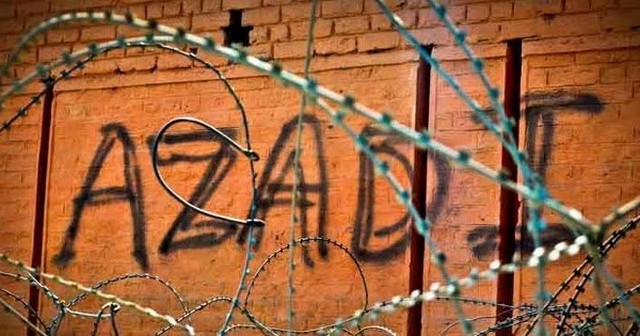By Dr Arshad M Khan
While there may be no real evidence of a historical Moses (for the Egyptians were obsessive about recording significant events, as an exodus of 2 M people would have been), the Hollywood version with Charlton Heston demanding, “Let my people go,” tells us not much has changed in human nature. Human lives and economic damage notwithstanding, India clings on to Kashmir with over a half million security personnel.
Following the death of the popular militant leader Burhan Muzaffar Wani, who was killed by security forces, Indian-ruled Kashmir has seen a spike in violence and huge on-going demonstrations.
The response to peaceful demonstrators with pellet guns has them escalating to rock-throwing. Guns kill and the tally now runs around 69 dead and several thousand wounded, some losing their sight. Just a drop in the ocean of blood (68,000 to 100,000 killed) since rebel groups took to arms in 1989 after four decades of empty promises. Perhaps the young men have nothing to lose. The new chant, “What do we want?” And the response, “Freedom!” rings throughout the valley.
There is a reason for the frustration: It is now 68 years since the Indian government’s white paper referring to a plebiscite and 67 since the UN mandate to hold one allowing Kashmiris to decide their own fate. What is there about some nationstates that continue to deny freedom to many minorities around our little globe, particularly in an age where sovereignty is so easily ceded to unity projects like the EU and to trade deals limiting the power of individual legislatures?
We live in an era where devolution, even independence, for distinct ethnicities is often a preferred solution. Through “Brexit” Britain has just retreated from the EU. Czechoslovakia split in two, peacefully, while Yugoslavia broke up in a convulsion of violence. There is a choice it seems, if the parties are not too blind to see it. The many Asiatic republics splintering from the former Soviet Union maintain close economic ties to Russia. In the last UK general election, the Scots voted a near clean sweep for the devolutionary Scottish National Party which won 56 seats out of 59, an unheard of gain of 50. And in the recent vote on the EU, Scotland voted in favor of “Remain” leading to the speculation that a new vote to leave the United Kingdom would almost certainly succeed and is likely to be held.
So why not a vote in Kashmir? Give the Kashmiris a choice: remain, leave India and become an independent state, or join Pakistan. Neither of the two contesting powers wins with the second option, which might thus be palatable.
If one thinks about it, commerce and open borders would soon put Kashmir’s troubled past in the rear-view mirror as in the case of France and Germany. Both Modi and Sharif, the two leaders, realized the importance of trade but recent events have overtaken them. They are unable now to cut through the dense undergrowth of suspicion, mistrust and grievances. And the Kashmiris, their kinfolk in the other Kashmir, and Indians must continue to suffer.
India also has other insurgencies of disaffected locals and Pakistan has its own problem in Baluchistan — yet another consequence of joining the war on terror. A disjointed world of sharp-tempers and no easy solutions. Also both strong militarily with large armies and nuclear weapons, now on a hair trigger due to the forward deployment of tactical warheads by Pakistan. Each country is therefore capable of obliterating the other and giving the world a nuclear winter.
Will reason prevail?
Dr Arshad M Khan (http://ofthisandthat.org/index.html) is a former Professor. A frequent contributor to the print and electronic media, his work has been quoted in the U.S. Congress and published in the Congressional Record.
27 August 2016

